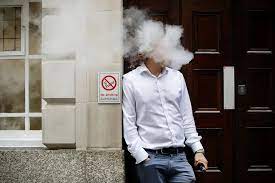Millions of illegal vapes seized in UK in three years, data shows

London: Millions of illegal and potentially harmful vapes have been seized by trading standards in the last three years, data shows, with experts warning this is the “tip of the iceberg” and a “tsunami” of products is flooding into the UK.
Freedom of information requests to 125 local authorities revealed that more than two and a half million illicit e-cigarettes were collected since the beginning of 2020.
Figures show that 1,352,063 were seized by trading standards at Hillingdon borough council in west London alone. The council area includes Heathrow airport, where thousands of unlawful vapes are arriving.
The e-cigarettes are not-compliant with UK legal regulations and could have higher nicotine concentration levels, contain banned ingredients or have oversized tanks for nicotine liquid. Previous analysis found illicit vapes to contain high levels of lead, nickel and chromium.
Kate Pike, the lead officer at the Chartered Trading Standards Institute, warned that the figures are likely to be the “tip of the iceberg” in terms of how many non-compliant vapes are being sold in UK shops.
She said: “I get calls from colleagues at the port almost every day – it feels like there is a tsunami. They are mainly coming from China.”
Doctors have called for an outright ban on disposable vapes – which come in bright colours and a variety of flavours – to reduce their popularity among young people as the long-term impact remains unknown.
There is rising concern over youth vaping in Britain, with the latest survey by Action on Smoking and Health (Ash) showing a rise in recent years. In 2022, 7% of 11- to 17-year-olds surveyed said they used vapes, compared with 3.3% in 2021.
Pike said non-compliant vapes were particularly popular with underage consumers – because they were cheap and could be bought in places that were less likely to check ID – and that research showed a third of products sold in UK shops were likely to be illegal.
“We don’t need sniffer dogs to find these products as they are all on shelves in high-street shops, in full view of the public,” Pike said. “There is a significant number of illegal products on the market, which does not help when we are trying to support the public health response, which is to ensure the products are much safer than tobacco for smokers looking to quit.
“The main concern is that young people are getting their hands on these products … We do not want children or adults getting addicted to something at all like this,” she said.
Pike said that illegal vapes often did not have the right warnings or information on their packaging. “We know that legal compliant vapes pose a fraction of the risk of smoking but we do not know what the risk is from illegal vapes,” she said.
The vaping industry is also calling for stronger enforcement of regulations and for illegal vaping products to be treated as seriously as counterfeit cigarettes.
Dan Marchant, the director of the retailer Vape Club, said illicit vape products “have the potential to be dangerous”. He said they could be spotted by how many puffs they advertise, as anything offering more than 500-700 has usually “not been through the appropriate testing and safety measures”.
Phil Jenkins, a senior London Trading Standards officer who oversaw the seizure of 1m illegal vapes at Heathrow last year, said they came in on commercial flights as standard cargo.
“They are declared as atomisers on the paperwork but when they come through we can see in the packaging they will have a battery warning and say they are vapes.”
Jenkins said businesses were factoring in that some vapes would be intercepted, so would over-order. He said officials had confiscated about 6 tonnes of illegal vapes this week, and so the FoI figures for Hillingdon were already out of date.
“They are not hidden or smuggled in but brought in openly, and people pay import duties. There is nothing illegal about transporting goods across borders, but they are illegal to sell,” said Jenkins.
Kent county council seized 329,276 illicit vapes in 2022 and has seized 49,528 in 2023 so far. Oliver Jewell, the council’s principal trading standards officer, said e-cigarette devices “play a legitimate part in the efforts to reduce smoking prevalence figures”.
He added: “Disposable e-cigarettes grew rapidly in popularity throughout 2022 and can be a highly profitable commodity for retailers, which in turn leads to some seeking a competitive edge by stocking illegal products.”
In Kent, trading standards officers are tackling the problem by visiting retailers to “provide advice and remove illegal products from the market while also ensuring those retailers have measures in place to prevent sales to young people”.
Data shows that 28 councils spent £9,000 testing vape products over the last three years. Earlier in the year, the government announced an “illicit vapes enforcement squad”, led by trading standards. Ministers said it would be backed by £3m in funding and would conduct test purchases and remove banned products from shops and at borders.
The government has also launched a call for evidence to “identify opportunities to reduce the number of children accessing and using vapes”.
A Department of Health and Social Care spokesperson said: “It is illegal to sell nicotine vapes to children and we are concerned about the recent rises in youth vaping, particularly because of the unknown long-term harms.
“We are taking bold action to end this practice through the £3m illicit vapes enforcement squad, which will tackle products imported and traded illicitly, remove illegal products from the market that don’t comply with our regulations, and tackle underage sales to children.
“We have also launched a call for evidence to identify opportunities to reduce the number of children accessing and using vape products and explore where the government can go further. The call for evidence has now closed, and the government will be considering a range of options based on the evidence provided.”





